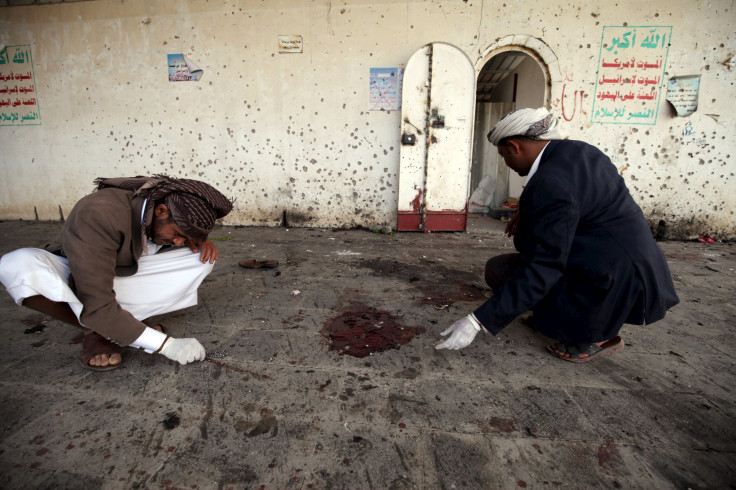ISIS Claim Of Suicide Bombings In Sanaa Raises Doubts

Two major Shiite mosques in Yemen’s capital Sanaa were filled with worshippers on Friday afternoon, the holiest day of the week in Islam, when at least four suicide bombers detonated their explosives, killing at least 142 people. It was one of the deadliest attacks in the country’s recent history. Yemen’s ruling Houthi group, which is Shiite, has enemies in both al Qaeda and the Islamic State group, both of whom could have played a role in Friday’s attack.
The simultaneous suicide bombings in the Badr and Hashoosh mosques also killed a prominent Houthi cleric, indicating the perpetrators wanted to strike at the top of Houthi hierarchy. Hours after the attack, a statement was disseminated through social media accounts affiliated with the Islamic State group, claiming responsibility for the blasts. If the claim is authentic, this would be the first ISIS attack in Yemen, where al Qaeda in the Arabian Peninsula has been the dominant Sunni jihadist group for years.
“AQAP has capabilities and knowhow, based on longstanding experience. AQAP has always targeted the security apparatus,” said Peter Knoope, an associate fellow at International Center for Counter-Terrorism, an independent think tank based in The Hague. “This is anti-Houthi, which is a different agenda.”
The statement accused the Houthis of being “polytheists” and condemned the group’s ties to the Shiite regime in Iran. The language, formatting and timing of its release is strikingly similar to the ISIS statement released Thursday claiming responsibility for the shooting at Tunisia’s Bardo Museum. Yet, neither document bore the ISIS flag, which appears in most of ISIS propaganda and official statements.
Both statements included inaccurate details about the attacks. Although ISIS propaganda has a penchant for amplifying their successes, the group has not been known to officially report lies. Thursday’s document claimed the "knights of the State of the Caliphate" carried out the Tunisian shooting but only mentions Abu Zakaria al Tunisi and Abu Anas al Tunisi, Tunisian ISIS and al Qaeda members who were killed before the attack. As for Yemen, the ISIS claim stated that five “soldiers of the Khalifa,” or caliph, carried out the bombings, but the presence of only four has been confirmed.
The unusual statement, coupled with the fact that AQAP has the highest capability of any group in Yemen to carry out an attack on this scale, raises questions about the authenticity of the ISIS claim. AQAP’s strength has long been in its ability and creativity when it comes to making bombs. On the group’s roster of bomb makers is Ibrahim al-Asiri, a Saudi national responsible for making the device used by the so-called underwear bomber, Umar Farouk Abdulmutallab, in 2009. A year later, AQAP claimed responsibility for a printer cartridge bomb sent to the U.S. in the mail.
The suicide bombers that detonated inside the two mosques on Friday had to be equally inventive, as the mosques had heavy security that included full body checks. At least one of the attackers concealed his explosive inside a leg cast, a surefire way to sneak past security.
Last year, ISIS released a video declaring that the caliphate had expanded to several countries including Yemen, as well Saudi Arabia, Libya and Algeria. At that time, the group had no significant presence in any of those countries and even now, only Libya has been declared an official ISIS wilayat (province).
“They’re all the same, anyone can put a statement online. They are all one. Just terrorists and criminals,” said Hussain al-Bukhaiti, a pro-Houthi translator and journalist with familial ties to the group. Al-Bukhaiti told IBTimes that he lost friends in the attack. “Doesn’t it seem strange to you that ISIS was created over a night? (sic). And then got bombs and suicide [attackers] and attacked?”
Conquering Yemen seems like an impossible ambition for ISIS, as its rival AQAP is considered to be one al Qaeda’s strongest branches and one of ISIS’ loudest adversaries among Muslim extremists. But AQAP has been weakened, under attack from the Houthis for the past year, and several members reportedly defected from the group to join ISIS last month.
The Houthi rebels seized the capital last year and forced U.S.-backed President Abed Rabbo Mansour Hadi to step down in January. Since then, the group has been involved in a fierce campaign to push out AQAP in order to boost its claim of being the only group able to improve quality of life for the average Yemeni. The Houthis say Friday’s attack was a response to the recent, fierce crackdown on al Qaeda militants in Yemen.
“Today, we emphasize that it is important to complete the revolutionary steps,” Houthi spokesman Mohammed Abdulsalam wrote in a statement posted to his Facebook page after the attacks. “To keep the people’s revolution going and protect their rights, security and stability. It has become clear that they seek to disrupt the political solutions in the dialogues.”
The suicide bombers’ identities are still not known, but according to one analyst, the group behind the attack matters much less than the target.
“Yemen has entered a new phase and has become part of a bigger agenda in the region,” said Knoope. “In that sense today's events fit in the larger picture that is emerging.”
© Copyright IBTimes 2024. All rights reserved.












